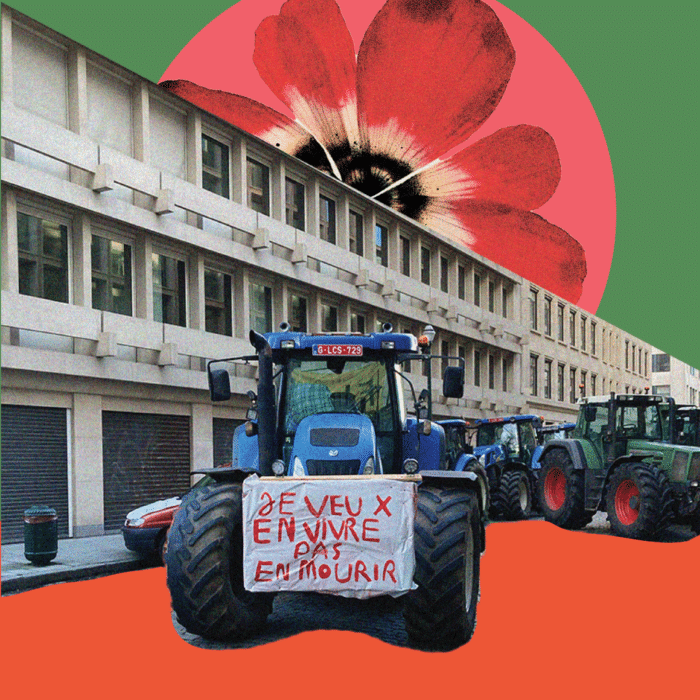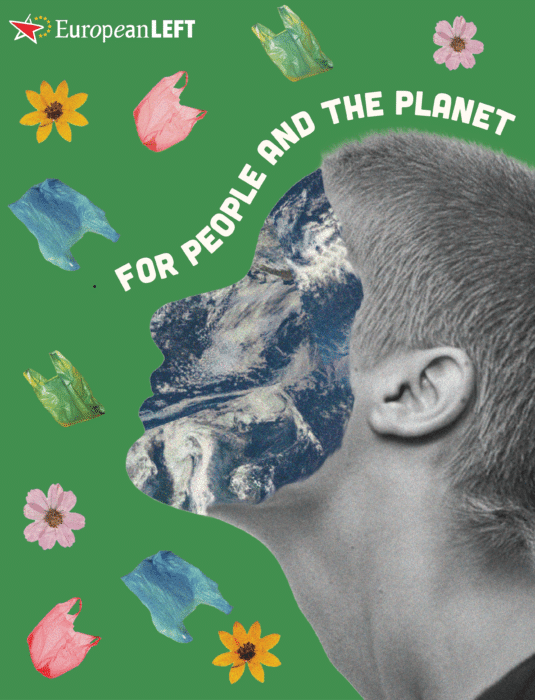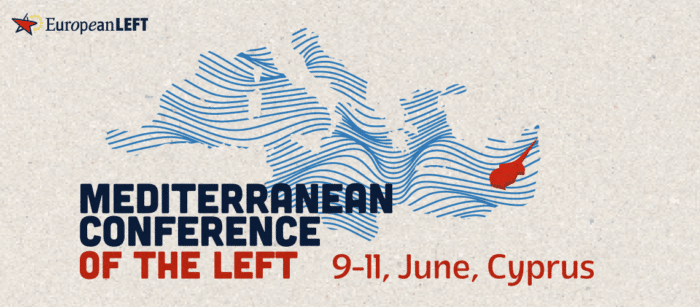Ecological
transformation
Don’t change the climate, change the system.
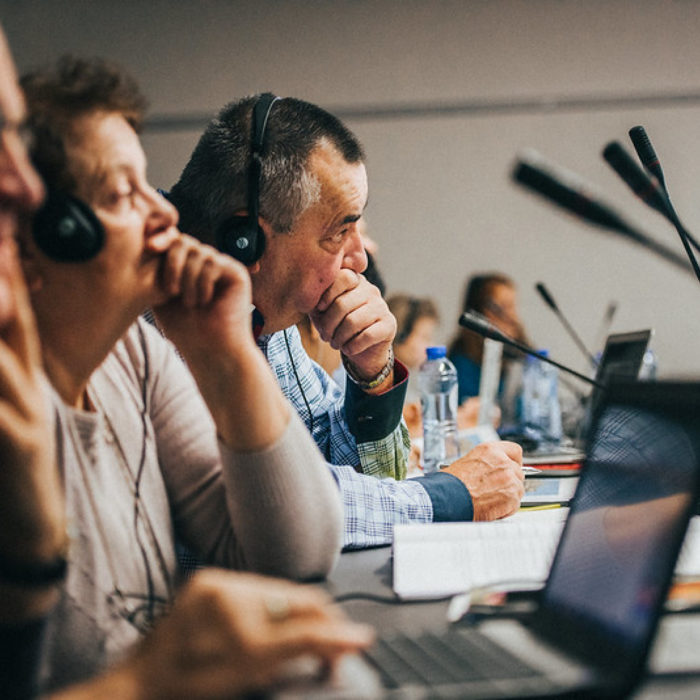
The capitalistic structure of the market created the problem
Climate change caused by human activity finds global scientific consensus, but the politics of the status quo knows only the laws of the market and is unable to present solutions. In fact, they look at the problems they cause today as something that tomorrow’s technology will solve. Some political fringes, inspired by Trumpism, want to turn the issue into a cultural war.
Capitalism is incompatible with sustainable human development respectful of the planet and by the same mechanisms creates social inequality, a huge gender gap, and threatens the sustainability of the planet. Those who have contributed the least to climate change are the ones who suffer the most from its consequences. It was also this model that caused extreme poverty, an enormous accumulation of wealth and inequality.
The extractivism and the burning of fossil fuels, the grabbing of common goods and the destruction of carbon sinks through these processes and intensive livestock farming and agriculture, are all linked. It is life itself on the planet that they threaten.
The left recognises the climate crisis as an emergency and is committed to transforming the economy away from the carbon paradigm, ensuring job creation, a fair distribution of wealth, elimination of the gender gap, robust and universal public services and public ownership of the commons for a fairer, participatory and democratically planned society.
The carbon market created the rich
The false solution of the status quo policy was the creation of the European Emissions Trading System (EU ETS). According to the Carbon Market Watch report, the free allocation of greenhouse gas emission allowances under the ETS has enabled, between 2008 and 2019, speculative profits of 50 billion euros for the European intensive emissions industry. Another mechanism of the financialisation of the climate response is carbon offsetting, which has been central to the advertising of big polluters.
This is the picture of green capitalism. Historical polluters were given wealth. When the super-rich are disputing a space race, when a few multinationals are the main parties responsible for greenhouse gas emissions, it is neither fair nor effective to ask for sacrifices and extra costs from the working class. The transition is social justice for a better life.
We propose to change the current capitalistic paradigm of combating climate change. The carbon market and the matrix used to offset emissions do not respond to the problem and should be abandoned. The change in the consumption and production model must be reorganised and democratically planned to meet social needs, ensure fair distribution of wealth, reduce emissions, and protect biodiversity.
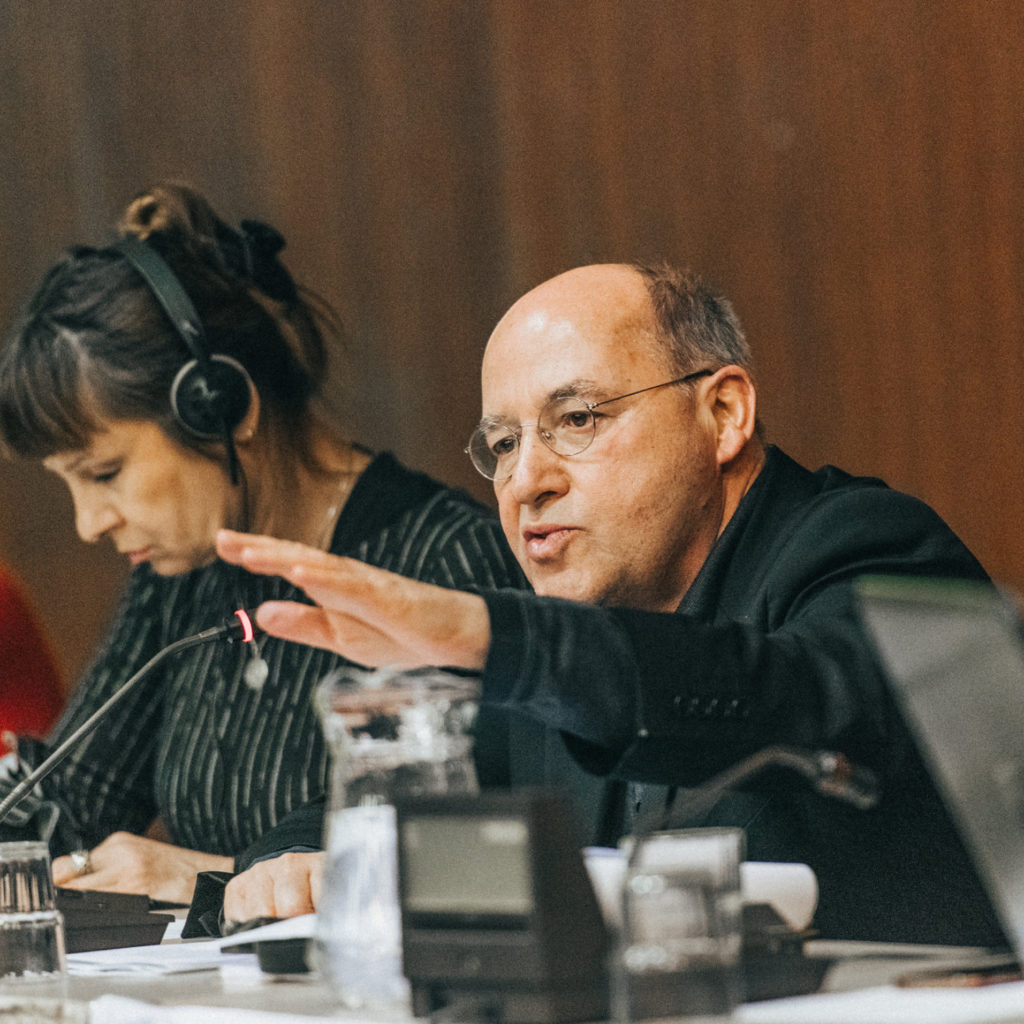

The left is the answer for equality and democracy
The first ecological transformation is to decide that the economic system is not driven solely by profit, even at the cost of destroying the planet. The purpose of the economic system is to meet social needs and give a fair and dignified life to the entire world population, and to do so within the limits of the planet. Democracy is the key.
GDP is an indicator that does not take into account much of the social and environmental impacts, so we propose to focus on alternative indicators that include societal, environmental and equality criteria.
Increase the European Union’s target for reducing greenhouse gas emissions from 55% to 65% in 2030 and bring forward the date for the European Union’s climate neutrality from 2050 to 2045.

Transforming production is transforming labour
We propose a reduction of the working days (without loss of remuneration) and that the increase in productivity is used for this purpose and for reorienting production towards social needs.
Undoing the international division of labour
We propose to build localised, sustainable productive capacity, adapted to regions and short consumption and production cycles, freeing the planet from a large part of the transport of goods by boat and trucks. This means a strong industrialisation (or reindustrialisation) of European countries with the guarantee of work with a fair wage and with production that respects the planet and is oriented towards social needs.
Creation of a public body to identify the industrial sectors that are essential for society and the ecological and energy transition in order to set it up or relocate it, recognising and addressing the need to decolonise social relations.

Public control of the commons
Public control of common goods like: water, sanitation and their services; hydrocarbons and other energy sources; energy production and distribution services. Furthermore, a change in the criteria for their operation, so that the priority is no longer the remuneration of shareholders but the guarantee of accessible public and universal services that meet the needs of society and that respect the limits of the planet and the preservation of biodiversity. And that any profits be used to improve or transform production and distribution systems.
Guaranteeing universal access to water and sanitation, declaring them fundamental rights, also addressing UN relevant decisions. Penalise excessive use.
Guaranteeing free access to the first quantities of energy considered essential to life, taking into account the climate and season of the year. Penalise excessive use.
Ensuring that the social and environmental function of water, air, energy and food takes precedence over large private property rights.
Keep it in the ground
We propose, immediately, not to exploit new fossil fuel reserves and to abandon the exploitation of reserves located in risk areas such as the deep sea and polar areas. Declare the total abandonment of hydrocarbon exploration as a goal to be achieved, namely in the EU policy and in the official resolutions of the climate COPs.

Energy production
- We propose that public energy companies reinforce renewable energy production with the objective of achieving a renewable energy mix.
- Implement programs of self-sufficiency energy to territories. Add micro-management or decentralised processes to the transition.
- Strategic role of the State, utilising the institution of pre-competitive innovative procurement in flagship innovation initiatives, in the fields of energy transition, environment, social housing, green transport, etc.
- Exit from the Energy Charter Treaty.
- VAT on energy must be reduced and harmonised across Europe.
Industrial conversion
The big companies and the multinationals should account and publish their direct and indirect emissions, with priority for the big polluters such as energy production, cement production and construction, transport and heavy industry.
Creation of a public organism to certify this carbon accounting and suggest alternative methods, techniques and materials for production, in order to reduce the consumption of energy, raw materials and emissions.
Ending all subsidies, incentives and tax benefits to big companies that are environmentally and/or socially perverse.
Continental transport of goods should primarily be done by railways.

Planned obsolescence
Introduce mandatory eco-design rules for products to ensure their sustainability and allow for the integration of upgrades, guaranteeing increased warranty periods and services of repairs and part replacements.

Green jobs
The reconversion of production sectors necessarily makes some jobs obsolete. But these jobs and workers are essential for the ecological and energy transition. Therefore, no worker can be left without work because of the transformations due to the ecological and energy transition. Their work is important, they must have adequate support and training for the transition functions. Therefore, we propose a massive investment plan for training and creation of green jobs based on the relaunch of essential public sectors and reindustrialisation in the areas of energy, transport, and urban rehabilitation, and in public services such as health and education. This is what we call lifelong job security and training.
Zero-carbon, efficient houses
Financing programmes, at no cost, for the transformation of houses for zero-carbon and energy-positive neighbourhoods, with thermal insulation, local and cooperative generation of renewable energy, and the use of ecological building materials.

A new mobility model, the alternative to the SUV economy
- Construction of electrified public rail links between major European cities.
- Strong public sectors in public transport, refusing the model of competition in the installation or the use of railways, favouring a logic of integration and development of the territories. European funding for decarbonised transport networks.
- Creation of on-demand public transport services in low population density areas.
- Create free public transport programmes.
- Electrification in transport and green public transport.
- Dismantling of the SUV economy with rules to car production that guarantee decarbonisation, less consumption and a design more compatible with the most vulnerable road users.
- The end, by 2026, of the production of new cars powered by fossil fuels in the UE.
- Reinforcement of charging points for electric vehicles.
- Developing car sharing programs, since cars spend most of their time stationary, thus reducing the need for vehicle production and the space and infrastructure needed to accommodate them in an urban environment.
- Banning flights in private jets, except for health or national security reasons.
- Interdicting the use of air connections between cities that have rail connections up to 3 hours, guaranteeing the investment in the densification and modernisation of the offer of these public transports.
- Creating incentives for commuting between home and work in sustainable mobility, on foot, bicycle and/or public transport.
New urban organisation
In cities and areas of high population density, urban planning should allow, at most within 15 minutes walking distance from each residence, all the services relevant to social life – such as public services like schools and hospitals, public transports, shops and markets, leisure areas, cultural structures, sports facilities and workplaces – by promoting also a green and digital transition of the public services for all, as well as access to disabled people.
In areas of low population density these facilities should be located within 15 to 30 minutes away by public transport or, if not possible, by car.
Integration in the urban environment of dedicated bicycle infrastructures, such as incorporation into public transport and bicycle parking facilities.
Promotion of green areas in residential areas and green corridors across the cities.
Reorganising the urban space by creating shelter areas in every city or village and ensure sufficient capacities at national and local levels, so as to handle the results of events such as forest fires, flooding or earthquakes.

Recovering ecosystems
- Restoring and maintaining ecosystems and conserving biodiversity have been sidelined in the climate response and treated as if they were a separate crisis. Biodiversity loss and the climate crisis are interdependent: ecosystem degradation removes or reduces carbon sinks, keeping more greenhouse gases in the atmosphere. Climate change reduces biodiversity.
- Encouraging public forestry acquisition through the public right of preference. Promoting and financing forestry cooperatives of small producers.
- Guaranteeing and promoting short production and transformation cycles, guaranteeing the creation of jobs in rural areas.
- Ensuring the traceability of wood imports and banning imports from areas of tropical deforestation.
- Banning the patenting of living organisms. Prohibit the cultivation, import and sale of genetically modified products.
- Ensure that the protected areas of the EU Biodiversity Strategy for 2030 are based on their ecological importance and that economic interests do not dictate the exclusion of areas of central importance. Strengthen cross-border cooperation to act more effectively to protect and restore the areas covered by the Natura 2000 network.
The Common Agricultural Policy
The Common Agricultural Policy (CAP) is one of the major financial envelopes of the European Union budget and for the period 2021-27 it will have 387 billion euros. The CAP is a failure for farmers, for the climate and for biodiversity. Over the decades, most CAP funds have been directed to big farmers, consisting of income that made richer those who were already rich. Small farmers and farm workers have not benefited from the CAP model that continues to fund large destructive models, without adequate space for nature, biodiversity, fair remuneration and ecosystem repair. This model also has a wide gender gap, women receive less than a third of the aid.
We support, in collaboration with social movements and progressive farming organisations, an agroecological policy model of the CAP concerning the three Pillars of sustainable agriculture, namely economic, environmental, and social. It must be focused on producing quality food and ensuring food sovereignty, as well as helping mitigate climate change. The CAP must be transformed by progressively eliminating its system of fund allocation by surface area, and redirect the funds towards environmentally friendly and labour-intensive sustainable agriculture, with added value and social equity and justice through agriculture.
Remuneration of ecosystem services to smallholders to ensure the preservation of biodiversity and compensate for the disadvantages of permitted uses.
Support the social economy and cooperatives promoting fair, healthy, and sustainable food supplies, which require healthy soil, water, marine ecosystems, renewable resources, energy communities, and biodiversity conservation.
Implement integrated crop protection and progressively abandoning the massive use of pesticides.
Implement short agricultural production and consumption chains to combat food waste and reduce the carbon footprint.
Prohibit payment to agricultural producers below the production price and guarantee controlled price limits for production and consumption, regulating consumption margins of big distribution, guaranteeing fair revenues for agricultural work and fair prices for consumers.
Implement awareness and training programmes for public agents to reduce the consumption of animal protein and promote vegetable protein like legumes. Provide a voluntary exit programme for farmers who wish to change from animal agriculture to plant food production or ecosystem services.
Increase the quality of food by guaranteeing a basket of fruit and vegetables with high nutritional content, of the season and of local production, with controlled price and zero VAT.
Ban all live exports outside the EU of livestock, strengthen controls within Europe.
Develop a plan for European food sovereignty and security, especially planning for inevitable shortages given climate change and ecosystem degradation.
Reduce importing soy and maize from the global South for animal feed, stopping unsustainable animal production that depends on massive imports and threatens the economy, the rainforest and even the human alimentation in the global South.

Saving the oceans
- Promotion of sustainable and environmentally friendly fishing gear. Intensive enforcement of rules against illegal or destructive practices.
- Stop pushing pressure on fishing fields outside the EU and promote sustainable consumption of fisheries.
- A 30-year moratorium on deep sea mining and subsequent re-evaluation.
- End of bottom trawling.
- Integrate the port areas in the railway network for the transport of goods.
- Implement marine renewable energy programmes in the public renewable energy strategy, taking into account the progress of marine spatial planning in each country. Energy production should be balanced with other economic activities, taking into account a fair share of resources and the revenues of small fishing communities.
Internationalist Solidarity
To meet historical justice and the present climate crisis, we propose that the focus of funding for climate change policies should no longer be on mitigation but also on adaptation, loss and damage, assistance in the face of extreme climatic phenomena and the preservation of carbon sinks such as tropical forests.

Civil protection
Invest in the education and training of the people, and create public civil protection services adapted to the risks of each territory and able to work in cooperation and in solidarity in the EU and in the world.
News about ecological transformation

Related press releases
Relevant Working Groups

contact us!
Want to join the EL ? Any questions ?
Get in touch with us by mail, we will get back to you as soon as possible.
